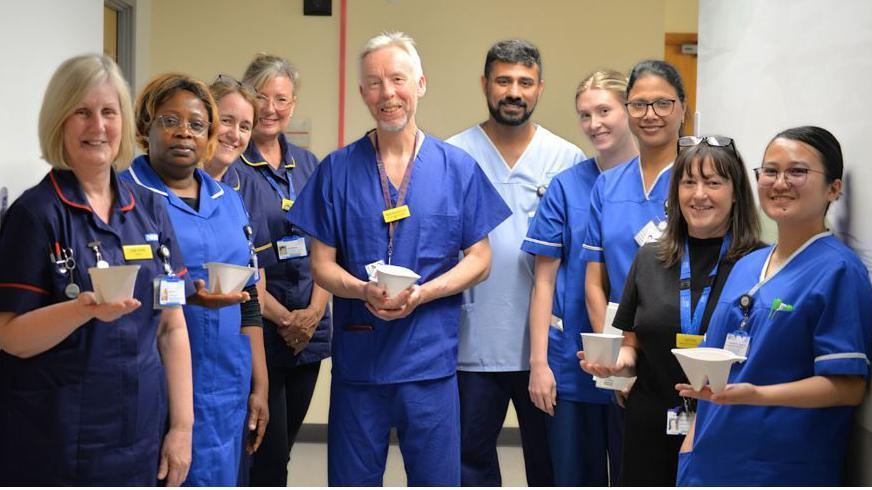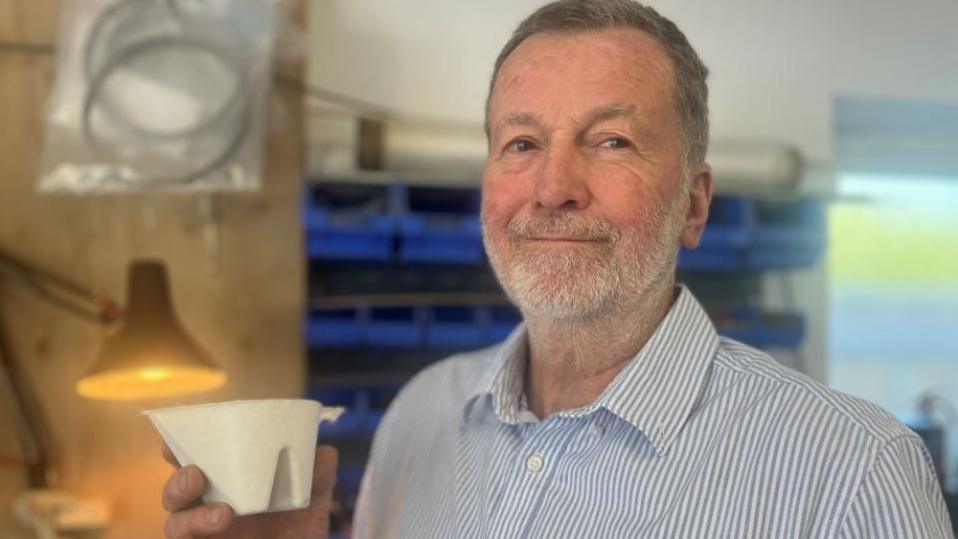Surgeon invents plastic-reducing urine collection pot

Urologist Nick Burns-Cox from Somerset Hospitals NHS Trust and his team
- Published
A hospital specialist has invented a new product that manages to reduce plastic and simplify the process of testing urine.
Consultant urologist Dr Nick Burns-Cox has been working on his own innovation, the Pee-In-Pot (PiP) for 10 years.
Made from bamboo and sugar cane, it removes four items from the current urine collection process, three of them plastic.
Mr Burns-Cox, who works at Musgrove Park Hospital in Taunton, said he hoped it would cut down the use of single-use plastic in the NHS and reduce the chance of errors.
The PiP is a two-compartment collection device which Mr Burns-Cox said will save health professionals time.
Previously in order to get urine into a 10ml collection tube for lab testing, patients were having to urinate into a sterile bowl where the urine was then syringed into a 30ml tube and sent to the lab where a technician had to pipette into into the correct 10ml tube.
Mr Burns-Cox said: "Not only was it wasting time, but it was wasting materials.
"Lots of single-use plastic was being utilised for every MSU collection."
He also added the old process increased the risk of human error, through mislabelling or contamination.

PiP designer Steve Swan created the device in his garden shed
The PiP device allows staff to tip out excess urine and only use the amount they need which can be easily transferred into the boric acid tube via a special funnel – saving time and reducing waste.
While it was invented by Mr Burns-Cox, it was designed and made by his former neighbour Steve Swan, from Blade Innovations.
Mr Swan, who has since moved to Cornwall, made the PiP from thermofibre, which is a blend of bamboo fibre and sugar cane pulp, formed at high temperatures in clean room conditions.
Easier collection
For every 1,000 inpatient beds, a hospital will carry out somewhere in the region of 21,000 mid-stream urine tests a year as a minimum.
Musgrove Park has said PiPs are more environmentally friendly because they can be disposed of via a macerator - a machine which reduces solids to liquids. The plastic equipment currently used is often incinerated.
It is believed that speeding up the process of collecting urine and using less plastic could save Somerset NHS Foundation Trust, which runs the hospital, more than £150,000 a year.
Mr Burns-Cox added: "The PiP makes the urine sample collection a lot easier for patients as it has a wider opening to the pot which is especially helpful for those who are unwell or struggle with mobility."
Tracey Doolan, an infection prevention and control nurse at Somerset NHS Foundation Trust, has been working with Mr Burns-Cox for 20 years and has championed the use of PiP from an initial trial in just one ward at Musgrove Park to the equipment now being made available across the NHS.
She said: "We were really interested in Nick's innovation from an infection control point of view, which led to lots of insight into our current practices and made us question how we do things and whether we could collect urine without needing to use a 'sterile' pot which has much larger CO2 and costs more too.
"We worked with an academic consultant microbiologist, medical statisticians, a clinical sustainability fellow, laboratory teams and infection control colleagues to test our research.
"We found that the PiP was safe to use for collecting urine, and didn't contaminate the specimen, meaning it didn't need to be sterile – a big step forward for us."
Get in touch
Tell us which stories we should cover in Somerset
Follow BBC Somerset on Facebook, external and X, external. Send your story ideas to us on email or via WhatsApp on 0800 313 4630.
Related topics
- Published7 May

- Published23 April

- Published22 April
